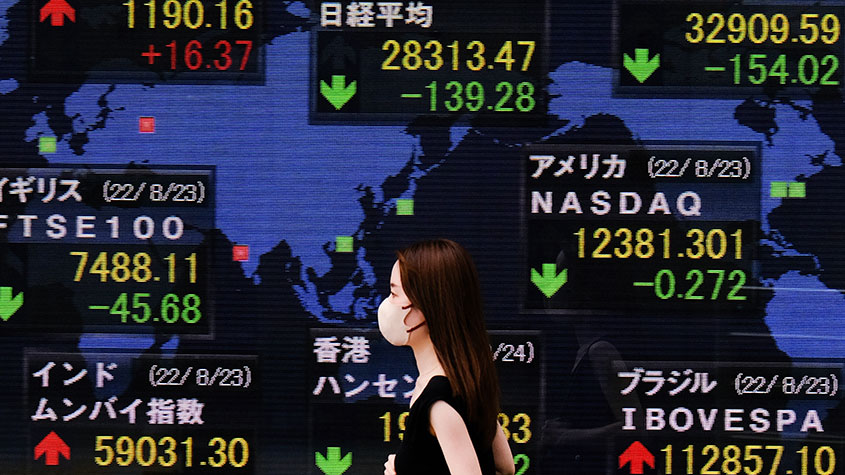Could your tracker fund be costing you a small fortune?
A tracker fund is an excellent way to invest in the market while keeping costs low, but some platforms are far more expensive than others. We look at the worst offenders.


Get the latest financial news, insights and expert analysis from our award-winning MoneyWeek team, to help you understand what really matters when it comes to your finances.
You are now subscribed
Your newsletter sign-up was successful
Want to add more newsletters?

Twice daily
MoneyWeek
Get the latest financial news, insights and expert analysis from our award-winning MoneyWeek team, to help you understand what really matters when it comes to your finances.

Four times a week
Look After My Bills
Sign up to our free money-saving newsletter, filled with the latest news and expert advice to help you find the best tips and deals for managing your bills. Start saving today!
The most expensive tracker funds are charging 20 times more than the cheapest alternative, potentially costing investors thousands of pounds over the longer term.
An investor with £10,000 in the most expensive UK stock market tracker fund will pay £106 in investment management fees every year, a huge premium over the estimated cost of £5 per year for the cheapest tracker fund, analysis from investment platform AJ Bell has revealed.
“It might come as a surprise, but not all tracker funds are created equal. There can be a big gulf in charges, and over time this can produce a seriously large dent in your nest egg if you happen to be invested in a higher cost tracker,” explained AJ Bell’s head of investment analysis, Laith Khalaf.
MoneyWeek
Subscribe to MoneyWeek today and get your first six magazine issues absolutely FREE

Sign up to Money Morning
Don't miss the latest investment and personal finances news, market analysis, plus money-saving tips with our free twice-daily newsletter
Don't miss the latest investment and personal finances news, market analysis, plus money-saving tips with our free twice-daily newsletter
Expensive tracker funds mean investors are being “ripped off”
Bella Caridade-Ferreira, CEO of Fundscape, agrees. "There are trackers out there – Virgin is the worst – where the fees are almost as high as actively managed funds. There’s no active management in a tracker so charging active-like fees for a tracker is simply ripping investors off," she said.
Holding the cheapest tracker fund could leave the investor with a portfolio worth £19,580 after a decade, but just £17,807 if they invested in the priciest instead, a difference of nearly £1,800 - even though both funds deliver identical performance, AJ Bell’s calculations show.
The most expensive tracker funds are often at least 0.2% more expensive than the cheapest option. In some cases they can cost 0.5% or even 1% more than the lowest price alternative tracking the same region.
| Row 0 - Cell 0 | Most expensive | Average | Cheapest |
| Asia Pac ex Jap | 0.32% | 0.18% | 0.11% |
| Europe ex UK | 0.13% | 0.12% | 0.06% |
| Global | 0.62% | 0.14% | 0.12% |
| Global EM Japan | 0.41% | 0.24% | 0.20% |
| Japan | 0.31% | 0.15% | 0.08% |
| North America | 0.30% | 0.10% | 0.05% |
| UK | 1.06% | 0.16% | 0.05% |
Source: AJ Bell/Morningstar
The report also highlighted that £10,000 tracking the UK stock market could sacrifice £1,800 in investment returns over a decade by holding the priciest fund.
Another way to look at it is an investor holding a mixed portfolio across seven of the main investment sectors across global equity markets could be almost £9,000 better off over 10 years, based on a £100,000 investment, according to the company.
Caridade-Ferreira explained that investors assume that all trackers are cheap, but they should compare providers and make sure they’re getting the best possible price. “Fidelity and Vanguard are among the cheapest in the market and investors should always include them in their comparisons,” she said.
How tracker funds work
Tracker funds, also known as Passive funds, track a particular part of the global stock market, often a region like UK, US or European companies. Naturally, this means that people with passive funds have no opportunity to outperform the stock market.
Conversely, actively managed funds aim to outperform the market by picking and choosing which stocks to hold and normally cost more as a result.
Khalaf added that with no chance of outperformance because they invest passively, the difference in returns between comparable tracker funds will be largely dictated by fees. “It therefore makes sense for investors to seek to reduce costs where possible, and sometimes this means voting with your feet and transferring to a new provider.”
Platforms restricted from telling investors about savings
Some of today’s most expensive trackers may have first been purchased by investors many years ago and originally priced with an ‘all-in’ fee covering investment, administration and any financial advice received at the time.
However, these funds are no longer perceived as good value with their costs rising after being moved to modern investment platforms since that time.
This means that while a tracker fund may have been good value when they were taken up, that may no longer be the case and it is likely investors could switch to cheaper funds.
What makes it more complicated for investors is they may not even be aware of this and investment platforms are not allowed to tell them.
Current rules mean that, were investment platforms to notify investors about possible cost savings on passive holdings in their portfolio, they may be deemed to have provided financial advice.
However, this could change. “The regulator is currently reviewing the dividing line between advice and guidance, and this is an example of how relaxing the rules could help investors to make better, more informed decisions,” said Khalaf.
Get the latest financial news, insights and expert analysis from our award-winning MoneyWeek team, to help you understand what really matters when it comes to your finances.
With more than 25 years as a journalist and editor, Angela’s work has appeared in outlets across the globe and at one stage she was the only female and youngest financial correspondent in the UK. Her articles have appeared in The Huffington Post, most UK and Irish nationals, including the Daily Telegraph, Sunday Times, Mail on Sunday, Scotland on Sunday and Business Post as well as myriad trade publications such as FT Adviser, MandateWire, Funds Europe, Global Legal Post, Smart Cities World and ESG Clarity US.
She also served as group editor and general manager for 13 titles across the island of Ireland and was a regular TV media commentator. While serving as Manhattan-based America correspondent she spent six weeks in Huntsville, Texas, becoming the first person to research the economics of the infamous prison which included interviewing prisoners just two weeks before their execution. Able to get under the bonnet of any subject, Angela has also helped start-ups, the world’s largest companies, governments and economic development agencies tell their stories.
-
 Can mining stocks deliver golden gains?
Can mining stocks deliver golden gains?With gold and silver prices having outperformed the stock markets last year, mining stocks can be an effective, if volatile, means of gaining exposure
-
 8 ways the ‘sandwich generation’ can protect wealth
8 ways the ‘sandwich generation’ can protect wealthPeople squeezed between caring for ageing parents and adult children or younger grandchildren – known as the ‘sandwich generation’ – are at risk of neglecting their own financial planning. Here’s how to protect yourself and your loved ones’ wealth.
-
 What is an index fund?
What is an index fund?Glossary We outline everything you need to know about index funds, from what they are and how to buy them, to the things to consider before you do so.
-
 Low-cost index funds for simple investing
Low-cost index funds for simple investingTips Index funds are an easy, low-cost way for investors to invest in a sector or asset class. Here’s a selection of the cheapest passive tracker funds on the market right now
-
 What is a tracker fund?
What is a tracker fund?Instead of trying to beat the market, tracker funds – also known as “passive” funds – try to track its performance. Here's what that means.
-
 Cracks appear in corporate-bond ETFs
Cracks appear in corporate-bond ETFsNews Severe volatility has opened up gaps between company-debt market trackers and the underlying assets.
-
How Jack Bogle transformed the investment industry for the better
Tutorials As founder and chairman of Vanguard Group, Jack Bogle, who died last night, pioneered index funds and democratised investing. John Stepek examines his legacy.
-
 A do-it-yourself ETF portfolio
A do-it-yourself ETF portfolioFeatures Take advantage of the low-cost exchange-traded funds disrupting the market.
-
 Simple portfolios for lazy investors
Simple portfolios for lazy investorsTutorials Cheap passive funds are a great way for busy people to invest, says David C Stevenson. And they're only going to get more popular.
-
The simple way to diversify your investments
Tutorials Multi-asset funds are a simple way to invest in a diversified portfolio for the long term. David C Stevenson runs through what's on offer.
